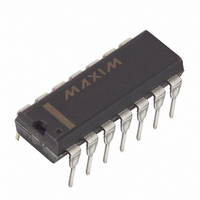DS1807+ Maxim Integrated Products, DS1807+ Datasheet - Page 2

DS1807+
Manufacturer Part Number
DS1807+
Description
IC POT ADDRESS 2X AUDIO 14-DIP
Manufacturer
Maxim Integrated Products
Datasheet
1.DS1807S.pdf
(13 pages)
Specifications of DS1807+
Taps
64
Resistance (ohms)
45K
Number Of Circuits
2
Temperature Coefficient
750 ppm/°C Typical
Memory Type
Volatile
Interface
I²C, 2-Wire Serial
Voltage - Supply
2.7 V ~ 5.5 V
Operating Temperature
-40°C ~ 85°C
Mounting Type
Through Hole
Package / Case
14-DIP (0.300", 7.62mm)
Resistance In Ohms
45K
Number Of Pots
Dual
Taps Per Pot
64
Resistance
45 KOhms
Wiper Memory
Volatile
Digital Interface
Serial (2-Wire)
Operating Supply Voltage
2.7 V to 5.5 V
Supply Current
40 uA
Maximum Operating Temperature
+ 85 C
Minimum Operating Temperature
- 40 C
Description/function
Addressable Dual Audio Taper Potentiometer
Mounting Style
Through Hole
Supply Voltage (max)
5.5 V
Supply Voltage (min)
2.7 V
Tolerance
20 %
Lead Free Status / RoHS Status
Lead free / RoHS Compliant
DS1807
The DS1807 is available in 14-pin DIP, SOIC, and TSSOP packages. The DS1807 is offered in industrial
temperature grades. The standard resistance of the DS1807 is 45 k .
DEVICE OPERATION
The DS1807 is an addressable, digitally controlled device that has two 65-position potentiometers. The
DS1807 potentiometers are logarithmic tapers providing a resolution or step size of 1 dB per step from
th
positions 0 through 63. The 64
position is the mute position and provides attenuation in excess of 90 dB.
Moving the potentiometer’s wiper from position 63 (or 63 dB of attenuation) to position 64 will provide a
step size in excess of 30 dB. A functional block diagram of the part is shown in Figure 1.
As stated, each potentiometer is composed of a 65 position resistor array. Two 8-bit registers, each
assigned to a respective potentiometer, are used to set wiper position on the resistor array. The wiper
terminal is multiplexed to one of 65 positions on the resistor array based on its corresponding 8-bit
register value.
Because the DS1807 has 65 positions, only seven bits of data are needed to set a wiper’s position. Bits 0
through 5 of the register are used to set the position on the resistor array. Bit 6 is used to set the wiper
position to the mute position and bit 7 is a don’t care. If the value of bit 6 is set equal to 1, regardless of
all other bit values, the wiper position of the respective potentiometer will be set to the mute position. An
example diagram of the wiper register and associated bit function is provided in Figure 2.
The DS1807 is designed to operate as an attenuator. (see Figure 3) As such, wiper position values are set
with respect to the amount of attenuation desired. For example, if the user wishes to attenuate an
incoming signal by 6 dB, the wiper position register value(s) should be set to binary (0000 0110).
The H0 and H1 terminals of the DS1807 have wiper position values (binary) 0000 0000. These terminals
provide 0 dB of attenuation for the input signal. The L0 and L1 terminals provide the greatest attenuation
of the input signal. They represent the mute positions for the DS1807 and have wiper position values
(binary) 0100 0000 or greater.
On power-up, the serial port is stable and active within 10 microseconds. Additionally, DS1807 wiper
positions will be set to position 63 or (binary) 0011 1111, one position above mute. The user may then set
the wiper register to a desired value.
Communication with the DS1807 takes place over the 2-wire serial interface consisting of the bi-
directional data terminal, SDA, and the serial clock input, SCL. The 2-wire serial interface and chip
select inputs A0, A1, and A2 allow operation of up to eight devices in a bus topology; with A0, A1, and
A2 being the physical address of the device. Complete details of the 2-Wire interface are discussed in the
section entitled “2-Wire Serial Data Bus.”
2 of 13
110499











